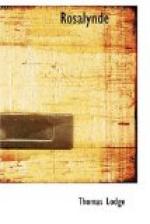[Footnote 1: P. 12.]
[Footnote 2: P. 17.]
[Footnote 3: P. 50. See, also, pp. 19, 41, 51, 59, 73, 97, 104.]
[Footnote 4: On page 72 Lodge accuses himself of digressing; but the four lines in which he here anticipates the conclusion of the story seem not to warrant the charge.]
The Lyrical Interludes. Lodge’s spirit is essentially poetical. One feels that his way of looking at things is that of a true poet; of one, that is, who sees beneath the shows of things. Lodge saw as clearly as Shakespeare did that only love can untie the knot that selfishness has tied. And not only is Lodge a poet in his outlook on life, but also in the narrower sense of the word, for he is one of the sweetest singers of all that band of choristers that filled the spacious times of great Elizabeth with sounds that echo still. The voices of some were more resonant or more impassioned; few, if any, were sweeter. Such a song as Rosalynde’s Madrigal, beginning,
Love in my bosom, like a bee
Doth suck his
sweet:
is as fluent, as graceful, and as mellifluous as anything that appeared in that marvelously productive time. Lodge’s poetic interludes impress one not only by their easy grace and sweetness, but by their melody as well. They possess that truly lyric quality that Burns’s songs exhibit to such a marked degree. They seem to sing themselves. It is almost impossible to read aloud the best of them, such as,
Like to the clear in highest
sphere
Where all imperial glory shines,
Of selfsame color is her hair,
Whether unfolded or in twines:
Heigh ho, fair
Rosalynde!




